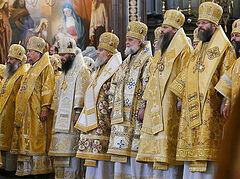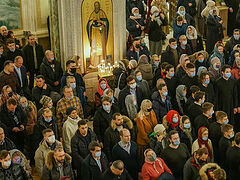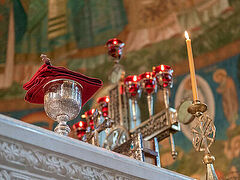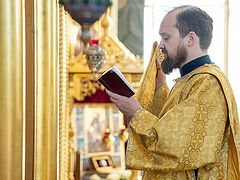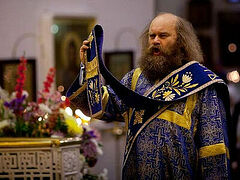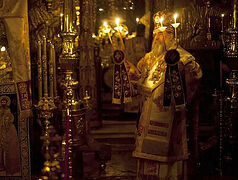I’ll tell you about a clock. It was 1977 when I went to New Skete, to Elder Joseph. Since I didn’t have a watch, the Elder bought me a battery alarm clock (they had just recently started selling such clocks—they used to have mechanical windups). The Elder brought it to my cell (it was still in the box it came in, for safekeeping) and warned: “This alarm clock is expensive, so make sure you never take it out of the box. When you want to know the time, just open the box, look at it, but don’t take it out of the box.” As the Elder said, so I did. I still have this clock in the same box. How many years have passed since 1977? The clock still works wonderfully. Whenever I went somewhere on the Holy Mountains—whether I was riding a mule up to Katounakia or I was out on a boat—I would put the clock in its box in my bag. I needed it so I wouldn’t oversleep and miss the service, to fulfill my duties on time. It fell out of my hands a thousand times. Despite all that, it has remained intact and still works, since it was in its box.
As a young man, a college student, of course I never even thought of keeping a clock in the box. Of course I would take it out of the box, take off the packaging… But since the Elder gave this blessing, I fulfilled it. How many clocks I’ve broken in my life, but the Elder’s clock still works! And I think it’ll keep working for many more years, although the button has worn out and the brand has worn off from frequent use all these years.
The elders taught us to treat not only people with respect and love, but everything around us in general.
Some of our contemporaries say: “The main thing is to love people.” I don’t disagree. Of course, we have to love them, because every person is the image of God. Others say: “You have to love not only people, but animals too.” Okay, love animals, but within reason. No need to adore them, no need to sit and talk with them, to share your problems with them—unfortunately, the latter is becoming a sign of our times. There’s even such a saying now: “If I don’t tell my dogs about my problems, who will I tell?”
I should have a kind and caring attitude towards people. Let my attitude to the things around me be the same: my homeland, city, home, office. May all my things be in order, inasmuch as the they are also sanctified by the grace of God. Even a saint’s belongings are sanctified.
When we visit places where the saints of our Church lived and labored (for example, the cell of St. Nektarios on Aegina), we can see the things and tools that the saints used. Modest cells, the simplest of things, but what love is visible in everything! There’s no trace of indifference. Not a single thing is just thrown wherever.
God, Whose image we are, didn’t create anything carelessly, but gave everything an amazing order, a wondrous harmony and balance.
Similarly, man is created in order to be in a proper, harmonious relationship with everything around him. When a man doesn’t have this kind of relationship, then there’s a lack of order in his soul, and there reigns unbalance, disharmony, and hatred for the things he uses, his house and the place where he lives, and for the people who manage him. You may completely disagree with something, but you have no right to hate anyone, or things, or anything around you, and especially to break or destroy something. The Divine Liturgy teaches us this—not to disdain anything.
Remember how St. Silouan the Athonite once squashed a fly, and then wept because he had hurt God’s creation. There’s no trace in his life of disregard for the things around him.
In the Liturgy, we pray not just for the country and the city with its buildings, but also for “the faithful that dwell therein”—for the inhabitants of this city, this country. We pray for our brethren in the faith, the children of the Church scattered across the face of the whole earth. Of course, we also pray for the entire world, inasmuch as every man is the image of God. The Lord calls every person to His Kingdom, but we entreat God for our brethren in the faith in a special way. Wherever we Orthodox Christians are in the world, the Divine Liturgy unites us, allows us to support one another with our prayer; it unites us with the grace of God. The prayer of one Christian covers the needs, problems, misfortunes, and difficulties of another.
***
Following this petition, the deacon proclaims the following: “For seasonable weather, abundance of the fruits of the earth, and peaceful times, let us pray to the Lord.” In other words, let’s ask the Lord for favorable and moderate winds—those that don’t harm human health; for the abundant harvest of the fruits of the earth, which strengthen us; and for peaceful times—so that mankind wouldn’t suffer from natural disasters occurring in the world, that our planet wouldn’t be shaken by particular natural disasters.
When God created the world and everything in it, there was nothing in the nature of the first-created world that would have rebelled against man. The beasts didn’t attack him. Lions, panthers, bears, and snakes behaved peacefully, without showing even the slightest aggression either to Adam or to each other. At that time, there were neither earthquakes, nor fires, nor tsunamis, nor any of the other disasters that shake the modern world. Complete harmony reigned in nature. Impermanence and mutability became inherent in the world of nature after the fall of man. Having fallen away from God, man dragged nature with him into the fall.
The holy ascetics, in returning to the blessed state in which Adam abode before his fall, no longer suffer any danger from the natural world. The elements obey them and wild animals don’t attack them. You can find hundreds of such examples in the lives of the ancient and modern saints. Mr. Christakis Christodoulidis, who is here with us, wrote a book, Saints and Animals, where he gives examples of how saints lived with wild animals and weren’t harmed by them. After all, according to St. Isaac the Syrian, animals have some knowledge of what Adam was like before the fall, thanks to which they sense holiness in an ascetic who has reached the state of Adam, and therefore they don’t bother him. You’ve all read the life of St. Paisios the Athonite. How many times he had to deal with poisonous snakes, with bears… The saints make friends with nature, and nature makes friends with them, without causing them any harm.
Nature suffers in some inexplicable way because of human sin. Remember, for example, the crucifixion of Christ, during which the sun went dark and a great earthquake occurred. It wasn’t Christ that darkened the sun and shook the earth; He didn’t command that all this should happen because of His crucifixion. But as it says in the beautiful troparion of Holy Friday and Holy Saturday, all of creation suffered seeing God humiliated and crucified. Nature rebelled against this lawlessness, that was taking place, exceeding all measure, and therefore the sun was blotted out and an earthquake occurred.
Today, people are so far from nature that they not only don’t feel the need to pray for “seasonable weather, abundance of the fruits of the earth, and peaceful times,” but they even laugh and sneer when they see others praying for it. Every year, when we send out our circular that molebens for the sending of rain should be served in our parishes, many journalists sneer at us: “These priests just looked at the weather forecast a few days ahead and they saw that there’d be rain on Friday, so they scheduled a moleben for that day.” They don’t pay attention to the fact that we distributed the circular three weeks before the moleben, while the weather forecast comes out only ten days in advance. And what about the fact that there were no such forecasts before, but after the Church served a moleben it started raining? You’ve all witnessed this several times, how during a prolonged drought, after the people of God, the whole Church, prayed for rain, the weather changed.
When we pray, we ask God to give us water to drink: “… And send down good rain upon us, that we might have our fill of water.” Some will say: “We have water, why pray?” Okay, we have water—we can buy it in the store. But in our prayers for the sending of rain we’re not talking just about people.
We also pray that the Lord would take pity upon the animals who have nowhere to drink from, and the birds, and the trees, and the grass:
Remember those who trust in Thee; remember the birds; remember the cattle, and grant the spirit of dew, and may the drought come to an end, and multiply the seeds of the earth for the raising up of man and animals.
The text of these prayers makes you feel responsible for the natural world and the necessity of praying for it. When I see during a prolonged drought how the trees suffer without moisture, how they don’t bear fruit and they dry up, I can’t be indifferent and just say: “I don’t care whether it rains or not,” or (this happens too): “I’d prefer it if it didn’t rain, so the porch doesn’t get dirty.”
It’s only when we’re aware of our responsibility that we’re capable of praying sincerely. Otherwise, we remain indifferent, and when we want, for example, to eat a tomato, we just go to the supermarket for it. When I don’t know how much work it takes to grow a tomato, I can easily throw it away. When I don’t know how much work it takes to produce olive oil, I don’t care if a bottle falls and shatters on the floor. But when I work hard to collect two buckets of olives that’ll be used to squeeze out a bottle of oil, then I’ll cherish it down to the very last drop and I’ll make sure nothing gets wasted.
From this point of view, the current economic crisis has its positive side: It can teach us to be careful with our things and to value them. It could teach us to pray to God for rain, for the preservation of the fruits of the earth, for the fertility of the soil, and for seasonable weather. In teaching us to pray for all of this, the Church brings us out of the narrow confines of our ego and makes us people with a universal consciousness—people who treat the world around them not with enmity, not with indifference, but with love for everything and everyone, because this is precisely how a child of God should be.



